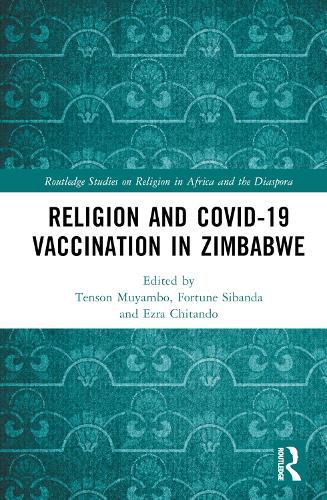Readings Newsletter
Become a Readings Member to make your shopping experience even easier.
Sign in or sign up for free!
You’re not far away from qualifying for FREE standard shipping within Australia
You’ve qualified for FREE standard shipping within Australia
The cart is loading…






This book analyses the role of religion during the COVID- 19 pandemic and vaccination rollout in Zimbabwe.
Zimbabwe was listed by the World Health Organization (WHO) as one of thirteen African countries to have fully vaccinated more than 10% of its population against COVID- 19 by the end of September 2021, but the country fell far short of the government's own target for achieving 60% inoculation by December 2020. This book analyses whether religion played a role in explaining why the government's pro- vaccine stance did not translate into high vaccination rates. Drawing upon various religions, including African indigenous religions, Christianity and Islam, the book considers how faith actors demonstrated vaccine acceptance, resistance or hesitancy. Zimbabwe offers a particularly interesting and varied case for analysis, and the original research on display here will be an important contribution to wider debates on religion and COVID- 19. This book will be useful to academics, researchers and students studying religious studies, sociology, health and well- being, religion and development.
$9.00 standard shipping within Australia
FREE standard shipping within Australia for orders over $100.00
Express & International shipping calculated at checkout
This book analyses the role of religion during the COVID- 19 pandemic and vaccination rollout in Zimbabwe.
Zimbabwe was listed by the World Health Organization (WHO) as one of thirteen African countries to have fully vaccinated more than 10% of its population against COVID- 19 by the end of September 2021, but the country fell far short of the government's own target for achieving 60% inoculation by December 2020. This book analyses whether religion played a role in explaining why the government's pro- vaccine stance did not translate into high vaccination rates. Drawing upon various religions, including African indigenous religions, Christianity and Islam, the book considers how faith actors demonstrated vaccine acceptance, resistance or hesitancy. Zimbabwe offers a particularly interesting and varied case for analysis, and the original research on display here will be an important contribution to wider debates on religion and COVID- 19. This book will be useful to academics, researchers and students studying religious studies, sociology, health and well- being, religion and development.